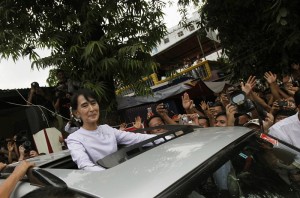
In this Monday, April 2, 2012 photo, Myanmar's opposition leader Aung San Suu Kyi acknowledges supporters from her vehicle as she leaves the headquarters of her National League for Democracy party in Yangon, Myanmar. More than a month later, Suu Kyi leaves Myanmar for a tour to connect with world leaders. She leaves the country Tuesday, May 29, 2012, after two decades under house arrest. (AP Photo)
BANGKOK — After 24 years in Myanmar, most of them spent under house arrest, Aung San Suu Kyi leaves Tuesday on an international tour to connect with world leaders and to deliver a Nobel Peace Prize acceptance speech more than two decades overdue.
Bangkok’s towering skyscrapers and sprawling urban lights will be the opposition leader’s first glimpse of the outside world, a stark contrast to the sleepy city of Yangon where the former military regime kept her a prisoner in her own home for a total of 15 years. She was to arrive Tuesday night and spend several days in Thailand, where she’ll speak Friday at the World Economic Forum on East Asia.
In mid-June she’ll head to Europe, with stops in Geneva and Oslo — to formally accept the Nobel Peace Prize she won 21 years ago. In Dublin, she’ll share a stage with U2 frontman Bono, a staunch Suu Kyi supporter, at a concert in her honor, according to Irish media. In England, she has been given the rare honor of addressing both houses of Parliament.
The tour of two continents marks Suu Kyi’s latest step in a stunning trajectory from housewife to political prisoner to opposition leader in Parliament, as Myanmar opens to the outside world and sheds a half century of military rule.
She hadn’t left Myanmar since a year before the Berlin Wall came down, in April 1988, when she flew to Myanmar to nurse her dying mother.
Until then she had led an international lifestyle, growing up partly in India, where her mother was ambassador. She later attended Oxford, worked for the United Nations in New York and Bhutan and then married British academic Michael Aris and raised their two sons in England.
She returned to Myanmar just as an uprising erupted against the military regime. As daughter of Gen. Aung San, the country’s independence hero, she was thrust into the forefront of demonstrations until the military brutally crushed the protests and locked her under house arrest in 1989.
Over the next two decades she became the world’s most famous political prisoner. During intermittent periods of freedom, she declined opportunities to go abroad for fear she would not be allowed to re-enter Myanmar.
Suu Kyi’s commitment to the cause came at high personal cost. She stayed in Myanmar even as her husband in England was dying of cancer in 1999. They last saw each other in 1995, after which the junta denied Aris a visa.
After her release from house arrest in November 2010, Suu Kyi had an emotional reunion with her youngest son, Kim Aris, after a decade-long separation; the junta had given him a visa.
The English leg of Suu Kyi’s trip is bound to include some family time. She will celebrate her 67th birthday on June 19 while in England, where Kim lives.
Suu Kyi’s aides have offered few details about her trip aside from the destinations, saying only that she will pack medicine for motion sickness.
“She gets airsick and seasick very easily. She will have to take her pills to prevent airsickness,” said Win Htein, a senior official from her National League for Democracy party. He said she was typically stoic ahead of her travels: “She doesn’t look too excited about it.”
Thailand was not part of the original itinerary but Suu Kyi decided last week to attend the economic forum. She has a Friday speaking slot that is bound to be the event’s main attraction.
Suu Kyi’s appearance at the conference had threatened to upstage that of Myanmar President Thein Sein, but he canceled over the weekend citing “urgent matters” at home, said Thai Foreign Ministry spokesman Thani Thongphakdi. He rescheduled his first official visit to Thailand for next week.
Thein Sein took power last year from the military junta following elections that were deemed unfair by international observers. Since then he has surprised much of the world by engineering sweeping reforms, though military leaders still have great control over the country.
Since Suu Kyi’s release, many international dignitaries have visited her in Myanmar, including Secretary of State Hillary Rodham Clinton in December and British Prime Minister David Cameron in April. Cameron suggested she visit her “beloved Oxford” in June.
Suu Kyi replied at the time: “Two years ago I would have said thank you for the invitation, but sorry. But now I am able to say perhaps, and that’s great progress.”